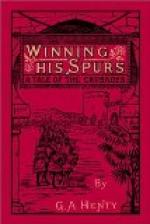Although unconquered in the fray, the Christian army was weakened by its sufferings to such an extent that it was virtually brought to a standstill. Even King Richard, with all his impetuosity, dared not venture to cut adrift from the seashore, and to march direct upon Jerusalem; that city was certainly not to be taken without a long siege, and this could only be undertaken by an army strong enough, not only to carry out so great a task, but to meet and defeat the armies which Saladin would bring up to the rescue, and to keep open the line down to Joppa, by which alone provisions, and the engines necessary for the siege, could be brought up. Hence the war resolved itself into a series of expeditions and detached fights.
The British camp was thoroughly fortified, and thence parties of the knights sallied out and engaged in conflicts with the Saracens, with varying success. On several of these expeditions Cuthbert attended the earl, and behaved with a bravery which showed him well worthy of the honours which he had received.
Upon one occasion the news reached camp that a party of knights, who had gone out to guard a number of footmen cutting forage and bringing it into camp, had been surrounded and had taken refuge in a small town, whose gates they had battered in when they saw the approach of an overwhelming host of the enemy. King Richard himself headed a strong force and advanced to their assistance. Their approach was not seen until within a short distance of the enemy, upon whom the crusaders fell with the force of a thunderbolt, and cleft their way through their lines. After a short pause in the little town, they prepared to again cut their way through, joined by the party who had there been besieged. The task was now however, far more difficult; for the footmen would be unable to keep up with the rapid charge of the knights, and it was necessary not only to clear the way, but to keep it open for their exit. King Richard himself and the greater portion of his knights were to lead the charge; another party were to follow behind the footmen, who were ordered to advance at the greatest speed of which they were capable, while their rearguard by charges upon the enemy, kept them at bay. To this latter party Cuthbert was attached.
The Saracens followed their usual tactics, and this time with great success. Dividing as the king with his knights charged them, they suffered these to pass through with but slight resistance, and then closed in upon their track, while another and still more numerous body fell upon the footmen and their guard. Again and again did the knights charge through the ranks of the Moslems, while the billmen stoutly kept together and resisted the onslaughts of the enemy’s cavalry. In spite of their bravery, however, the storm of arrows shot by the desert horsemen thinned their ranks with terrible rapidity. Charging up to the very point of the spears, these wild horsemen fired their arrows into the faces of




